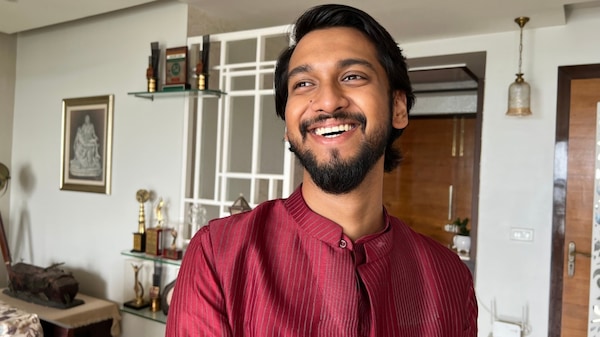Exclusive! Ujaan Ganguly on ‘boycott’: The instinct and tendency to write something off makes no sense
His film Lokkhi Chele will hit the theatres on July 25.

Last Updated: 08.37 PM, Aug 21, 2022
Ujaan Ganguly is all geared up with the promotions of his upcoming film Lokkhi Chele. Directed by Kaushik Ganguly, the film is set to release when films are facing boycott calls from social media trolls. After Bollywood films Laal Singh Chaddha and Raksha Bandhan, Bengali films Dharmajuddha and Bismillah have also faced similar threats. The young actor, who just submitted his dissertation on censorship at the University of Oxford and has decided to pursue his acting and writing career in Kolkata, talks about his opinion on writing off culture, his plans and his upcoming film. Read on…
You have completed your post-graduation. Any plan for further studies?
I am planning to pursue my writing and acting career in India. If I wish, I may pursue research and a PhD later.
When did you come back and how are the promotions of Lokkhi Chele going?
I came back in July and currently I am neck-deep in promotional activities of Lokkhi Chele and I am very happy to be back. We shot the film three years ago and ever since many of us got busy with our lives. However, we took no time in reconnecting.
I remember three years ago, we were shooting in Purulia. It was boiling there and we used to get exhausted every day. However, we used to sit and chat about the day. We used to share our experiences. I always find it important for artistes to have their interpretations of a story. That bonding resulted in the street play that we are performing as part of our promotions. We have been staging the plays at ungodly hours. The other day we performed near Dum Dum Metro Station. At 11.30 pm people flocked around us to watch the play. Thousands of people are watching the play on Facebook Live. I hope it will translate into theatres.
Lokkhi Chele talks about a series of incidents in rural Bengal where faith and rationalities are very different from the way the majority of urban people see it…
We live a sheltered life. I also feel that we have a myopic understanding of superstitions. I was reading somewhere that a certain level of rationality is conditioned by the society we grew up in, the people we interact with and so on. For some people, rationality fails when superstition and blind faith comes in. Lokkhi Chele does not talk about right or wrong but it talks about the vulnerability of people. While casteism is a reality in rural Bengal, there is a power structure beyond that. There are other hierarchical structures where the people at the lower rung are exploited. We tried to explore that structure.
Lokkhi Chele deals with the certain medical rationales of a child who has four arms and four legs. In India, several rationalists are throttled and killed in recent times. Do you think Lokkhi Chele can be an answer to that intolerance?
I feel that as artistes, our art forms are our way to protest instead of social media. Social media is an eco chamber of disparate opinions. It is a strange package of intentions. I believe the arts can bring changes effectively.
I know how ideas can be throttled. My mother directed Nirbasito and she came across death threats and whatnot. We have seen what happened to Salman Rushdie and what happened to several translators who translated The Satanic Verses. We are aware of the difficulties. Lokkhi Chele is more about portraying realities than anything else.
The opposite of rationality is being illogical. Superstition perpetuates from a lack of logic. Lokkhi Chele also reaches out to that larger group of people who are not comforted by conventional rationality. There is no hard and fast rule that if a person is superstitious they will be intolerant. Similarly, if a person is devoid of superstition, there is no guarantee that they will be tolerant. Lokkhi Chele addresses many such contradictions.
A number of films are facing the wrath of boycott calls on social media. After Bollywood, two Bengali films, Dharmajuddha and Bismillah are also facing similar calls. Your film is being released in this environment. How are you prepared?
I think no one is immune to boycott. I am not getting into the merit of a film because I did not get a chance to watch either of the said films. But every film must stand a chance. The instinct and tendency to write something off make no sense. One has to watch a film, read a poem or a novel and exfoliate to go deeper. I don’t want to take away the rights of someone who watched a film and has certain points to make. We have to introspect why a person has an opposite opinion from what we have created. Anyway, the ‘banning’ culture is still not here in the regional industries as much as it is in Bollywood.
Religion is a way of life. There are many good things in a lot of religions. Lokkhi Chele brings out beautiful golden nuggets from religions.
Subscribe to our newsletter for top content, delivered fast.
